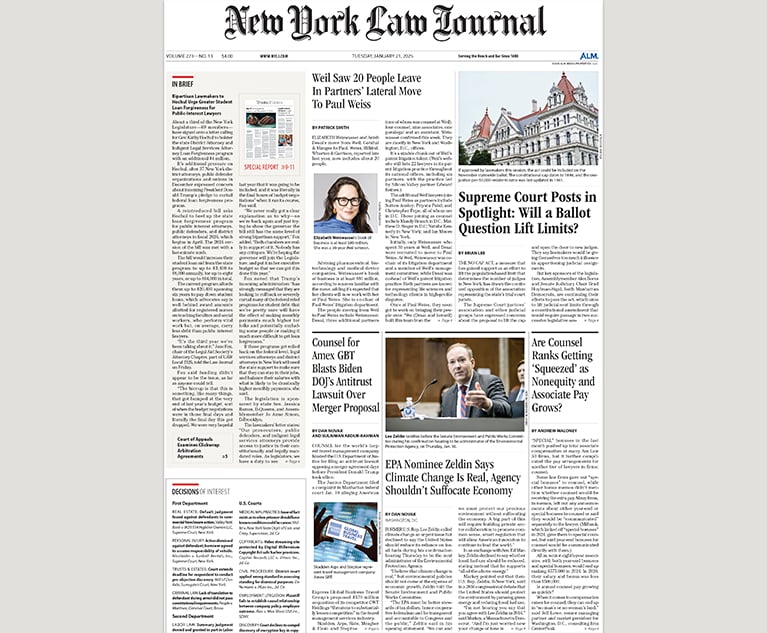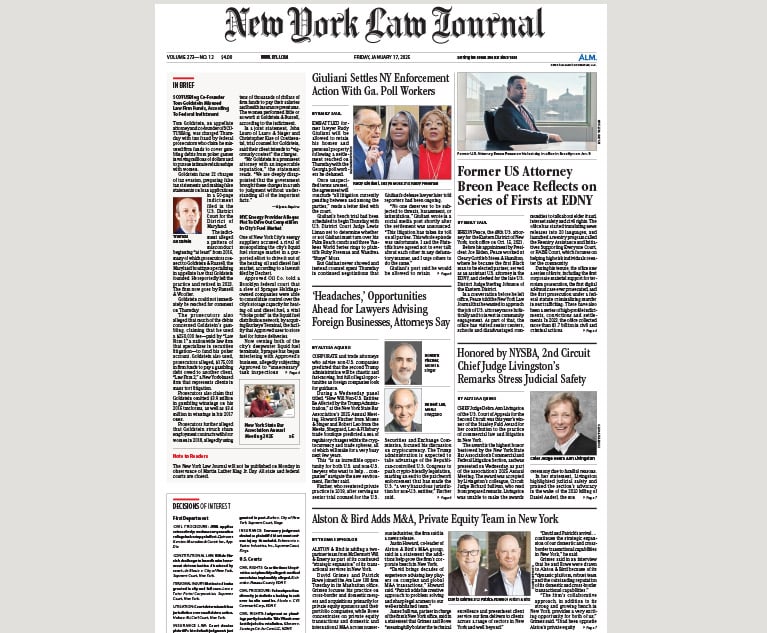Lisa Smith: Lawyers Who Struggle With Mental Illness Shouldn't Be Afraid to Seek Help
Alcohol and cocaine fueled the start of Smith's career, but getting clean—and sharing her story—propelled her forward.
May 12, 2019 at 07:00 PM
7 minute read
The original version of this story was published on Law.com
 Lisa Smith, with Patterson Belknap Webb & Tyler, author of Girl Walks Out of a Bar, a memoir about her struggle with addiction and recovery.
Lisa Smith, with Patterson Belknap Webb & Tyler, author of Girl Walks Out of a Bar, a memoir about her struggle with addiction and recovery.
Lisa Smith started her day April 5, 2004, the same as any other: unbearably hungover and propped up on a mix of booze and cocaine.
That particular routine had been standard for eight months. The heavy drinking started a decade earlier. The life of a young attorney in New York City was hard for everyone, she reasoned. A long day was washed down by a glass of wine or two. Colleagues flooded the bar after closing a deal or winning a big hearing.
Her work was outstanding. She excelled in law school and landed a coveted associate position at New York law firm Shearman & Sterling.
Her addiction came as a series of compromises: “I'm not an alcoholic; I don't drink during the day,” she would tell herself until she began coupling her lunches with a few beers. “Ok, well I don't drink during the morning,” kept up the illusion for awhile. Eventually, her hangovers were so rough that she started drinking in the morning. She found it smoothed her out. When even the alcohol wasn't enough to straighten her out for work, she added cocaine to the routine.
 She had long known she was an alcoholic. But she didn't care. She ceased contributing to her retirement at 32 because she thought she wouldn't live past 40. She worked from home to hide her addiction.
She had long known she was an alcoholic. But she didn't care. She ceased contributing to her retirement at 32 because she thought she wouldn't live past 40. She worked from home to hide her addiction.
But that Monday morning, her body decided it had enough. Walking out of her door, she was hit with the sudden feeling of being overwhelmed. Her world was spinning. She thought she was dying.
She wasn't dying. It wasn't an overdose or a heart attack. She had a panic attack.
Faced with what she thought was certain death, Smith had a change of heart. “For all the times leading up to that where I would wake up in the morning and wish I hadn't woken up,” she said. “In that moment when I actually thought, 'this is it, I am dying,' something snapped in me, and I said, 'no, I want to live.'”
Doctors diagnosed her with clinical depression and put her on medication. Outpatient rehab treatment and a 12-step program followed. Looking back, Smith saw her depression intertwined with her descent into addiction.
“By nature, I was always a gloomy, anxious kid,” she said. “Kids would be lining up for a roller coaster and be all excited, and all I could picture was the cart crashing to the ground.”
At an early age, Smith found reprieve in food, sneaking away to gorge on sweets. Alcohol came into her life by way of high school, and she took to it immediately. She developed a reputation for partying hard and blacking out, although she always thrived academically.
The trend followed her to an undergraduate degree at Northwestern University, then to law school, where she made editor-in-chief of the Rutgers Law Review.
She began drinking nightly her first year as an associate. Practicing law is stressful. The hours are long, and there's always an adversary, she said. The legal industry is drowning in alcohol. Drinking lubricates conversations at stuffy galas; clients are won over wine.
Two things set Smith apart: Her then-undiagnosed depression and a genetic predisposition. Her maternal grandfather died of alcoholism. Alcohol, not networking, brought Smith to legal events. She would organize her day around drinking, planning out the hours she had to be in meetings so she knew when she could get away. She was regularly vomiting blood. Her blase attitude toward her addiction was fueled by suicidal tendencies.
Smith kept working while in recovery but kept a low profile. In her last three years at Shearman she began working in practice development. By the time she bottomed out in 2004, she had taken a client development position at Pillsbury Winthrop Shaw Pittman. A year after hitting her lowest point, she moved to Patterson Belknap Webb & Tyler as marketing director. She didn't bring up her sobriety when she interviewed at the firm. It wasn't their business, she felt, and she shared her story with a select few.
Smith said that she was lucky that sobriety stuck. It helped that her doctor correctly diagnosed her the first time, which is rare.
“I felt relieved,” she said.
She takes her medication “religiously,” although she still experiences depressive episodes. She was also fortunate that she was able to come home each day to a nice apartment and hold on to a lucrative job. For many, recovery comes with court dates and fees, an imploding social life. She wasn't forced to quit drugs and alcohol; she wanted to.
She wrote privately about her experience. She found it cathartic. Deep into a bender, she would always tell herself she would write a book. And after arriving at Patterson in 2005, Smith compiled her writing and landed a book deal for her memoir, “A Girl Walks Out of the Bar.”
While she was elated, she knew the truth would have to come out. She made her way from partner to partner to share her story. During those conversations, her fear melted away.
“I was nervous. I didn't know how I would be perceived,” Smith said. “What I found in that process was that inevitably people would say before I finished my story, 'oh, my cousin. My roommate. My neighbor.' Everybody knew somebody. And a lot of people I told had questions. They have this issue in their lives in some form. And they want to help.”
Smith is not advocating to abolish booze from the profession. Instead, she wants attorneys who are too afraid to ask for help to come out into the open. She wants law firms to look at addiction from a risk-management perspective. At the very least, she wants an open conversation. A person is only high-functioning for as long as they can keep up the illusion and avoid catastrophic mistakes, she said.
“They're high-functioning, but also high-risk,” she said. “You're high-function until you miss a big hearing, or mess up a contract.”
Smith has also found that, while successful, alcohol held her back from reaching her full potential. All of the days she worked from home could have been spent in the office brainstorming with colleagues.
Smith is now a deputy executive of client relations at Patterson, a job she was elevated to five years ago. She has been sober for 15 years. And sobriety has become part of her identity. She co-hosts a podcast, Recovery Rocks, and tours the country giving speeches at law firms, bar associations and law schools.
“It's important for us to raise our hands and put a name and a face to it,” she said. “It shouldn't be incumbent on the people who struggle with these issues to find the solution.”
This story is part of a special report on mental health and the legal profession from Law.com: Minds over Matters.
This content has been archived. It is available through our partners, LexisNexis® and Bloomberg Law.
To view this content, please continue to their sites.
Not a Lexis Subscriber?
Subscribe Now
Not a Bloomberg Law Subscriber?
Subscribe Now
NOT FOR REPRINT
© 2025 ALM Global, LLC, All Rights Reserved. Request academic re-use from www.copyright.com. All other uses, submit a request to [email protected]. For more information visit Asset & Logo Licensing.
You Might Like
View All

Alston & Bird Adds M&A, Private Equity Team From McDermott in New York
4 minute readTrending Stories
- 1Relaxing Penalties on Discovery Noncompliance Allows Criminal Cases to Get Decided on Merit
- 2Reviewing Judge Merchan's Unconditional Discharge
- 3With New Civil Jury Selection Rule, Litigants Should Carefully Weigh Waiver Risks
- 4Young Lawyers Become Old(er) Lawyers
- 5Caught In the In Between: A Legal Roadmap for the Sandwich Generation
Who Got The Work
J. Brugh Lower of Gibbons has entered an appearance for industrial equipment supplier Devco Corporation in a pending trademark infringement lawsuit. The suit, accusing the defendant of selling knock-off Graco products, was filed Dec. 18 in New Jersey District Court by Rivkin Radler on behalf of Graco Inc. and Graco Minnesota. The case, assigned to U.S. District Judge Zahid N. Quraishi, is 3:24-cv-11294, Graco Inc. et al v. Devco Corporation.
Who Got The Work
Rebecca Maller-Stein and Kent A. Yalowitz of Arnold & Porter Kaye Scholer have entered their appearances for Hanaco Venture Capital and its executives, Lior Prosor and David Frankel, in a pending securities lawsuit. The action, filed on Dec. 24 in New York Southern District Court by Zell, Aron & Co. on behalf of Goldeneye Advisors, accuses the defendants of negligently and fraudulently managing the plaintiff's $1 million investment. The case, assigned to U.S. District Judge Vernon S. Broderick, is 1:24-cv-09918, Goldeneye Advisors, LLC v. Hanaco Venture Capital, Ltd. et al.
Who Got The Work
Attorneys from A&O Shearman has stepped in as defense counsel for Toronto-Dominion Bank and other defendants in a pending securities class action. The suit, filed Dec. 11 in New York Southern District Court by Bleichmar Fonti & Auld, accuses the defendants of concealing the bank's 'pervasive' deficiencies in regards to its compliance with the Bank Secrecy Act and the quality of its anti-money laundering controls. The case, assigned to U.S. District Judge Arun Subramanian, is 1:24-cv-09445, Gonzalez v. The Toronto-Dominion Bank et al.
Who Got The Work
Crown Castle International, a Pennsylvania company providing shared communications infrastructure, has turned to Luke D. Wolf of Gordon Rees Scully Mansukhani to fend off a pending breach-of-contract lawsuit. The court action, filed Nov. 25 in Michigan Eastern District Court by Hooper Hathaway PC on behalf of The Town Residences LLC, accuses Crown Castle of failing to transfer approximately $30,000 in utility payments from T-Mobile in breach of a roof-top lease and assignment agreement. The case, assigned to U.S. District Judge Susan K. Declercq, is 2:24-cv-13131, The Town Residences LLC v. T-Mobile US, Inc. et al.
Who Got The Work
Wilfred P. Coronato and Daniel M. Schwartz of McCarter & English have stepped in as defense counsel to Electrolux Home Products Inc. in a pending product liability lawsuit. The court action, filed Nov. 26 in New York Eastern District Court by Poulos Lopiccolo PC and Nagel Rice LLP on behalf of David Stern, alleges that the defendant's refrigerators’ drawers and shelving repeatedly break and fall apart within months after purchase. The case, assigned to U.S. District Judge Joan M. Azrack, is 2:24-cv-08204, Stern v. Electrolux Home Products, Inc.
Featured Firms
Law Offices of Gary Martin Hays & Associates, P.C.
(470) 294-1674
Law Offices of Mark E. Salomone
(857) 444-6468
Smith & Hassler
(713) 739-1250








